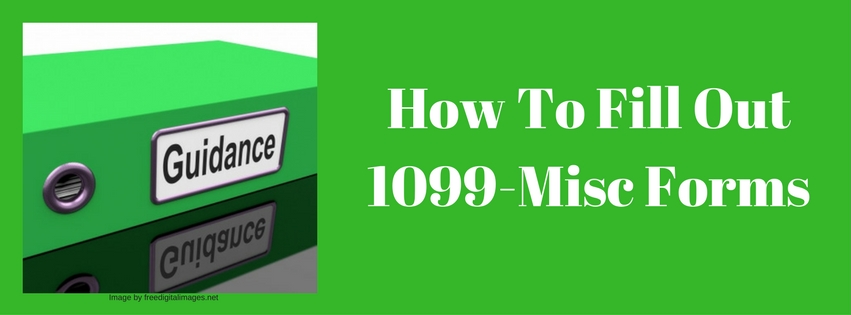In the last post, I discussed the exceptions to the 1099 rules. If you missed the post, you can read it here.
Today I’m going to explain how to properly fill out the forms required by the IRS. There is a lot of information listed in the IRS instructions that doesn’t apply to most small businesses, so I’ll leave that out of this post. If you’d like to see the full instructions, they can be found at http://www.irs.gov/pub/irs-pdf/i1099msc.pdf.
In the Payer’s Name section, include the business name, address, and telephone number. In the Payer’s federal identification number box, include your tax ID number (EIN is format of XX-XXXXXXX, Social Security is format XXX-XX-XXXX).
Enter the recipient’s identification number using hyphens in the proper format. Social Security numbers (SSNs) should be in the XXX-XX-XXXX format. Employment Identification Numbers (EINs) should be in the XX-XXXXXXX format. You should make every effort to ensure that you have the correct type of number reported in the correct format. When entering the recipient’s name, put the owner’s name first if it is not an entity (a sole proprietorship, etc). You may list the business name below the owner’s name. Include the recipient’s address.
The account number is required if you have multiple accounts for a recipient for whom you are filing more than one Form 1099-MISC. Additionally, the IRS encourages you to designate an account number for all Forms 1099-MISC that you file.
Enter the total subject amount paid in the calendar year under one of the following boxes (based on the type of payments):
Box 1: Rents
Enter amounts of $600 or more for all types of rent, such as any of the following:
- Real estate rentals paid for office space. However, you do not have to report these payments on Form 1099-MISC if you paid them to a real estate agent.
- Machine rentals (for example, renting a bulldozer to level your parking lot). If the machine rental is part of a contract that includes both the use of the machine and the operator, prorate the rental between the rent of the machine (report that in box 1) and the operator’s charge (report that as non-employee compensation in box 7).
Box 3: Other Income
Enter other income of $600 or more required to be reported on Form 1099-MISC that is not reportable in one of the other boxes on the form. For instance, if you are a law firm that paid funds to a client after winning a case, those funds would be reported in box 3.
Box 4: Federal Income Tax Withheld
Enter backup withholding. Persons who have not furnished their TIN (Taxpayer Identification Number) to you are subject to withholding on payments required to be reported. Most businesses do not have this issue, however, some businesses have received notification from the IRS to withhold due to a name/TIN mismatch and must do so.
Box 6: Medical and Health Care Payments
Enter payments of $600 or more made in the course of your trade or business to each physician or other supplier or provider of medical or health care services. Include payments made by medical and health care insurers under health, accident, and sickness insurance programs. If payment is made to a corporation, list the corporation as the recipient rather than the individual providing the services.
The exemption from issuing Form 1099-MISC to a corporation does not apply to payments for medical or health care services provided by corporations, including professional corporations. However, you are not required to report payments made to a tax-exempt hospital or extended care facility or to a hospital or extended care facility owned and operated by the United States (or its possessions), a state, the District of Columbia, or any of their political subdivisions, agencies, or instrumentalities.
Box 7: Non-employee Compensation
Include fees, commissions, prizes, and awards for services performed as a non-employee, or other forms of compensation for services performed for your trade or business by an individual who is not your employee.
If the following four conditions are met, you must generally report a payment as non-employee compensation.
- You made the payment to someone who is not your employee;
- You made the payment for services in the course of your trade or business (including government agencies and nonprofit organizations);
- You made the payment to an individual, partnership, estate, or, in some cases, a corporation; and
- You made payments to the payee of at least $600 during the year.
Generally, amounts reportable in box 7 are subject to self-employment tax. If payments to individuals are not subject to this tax and are not reportable elsewhere on Form 1099-MISC, report the payments in box 3
